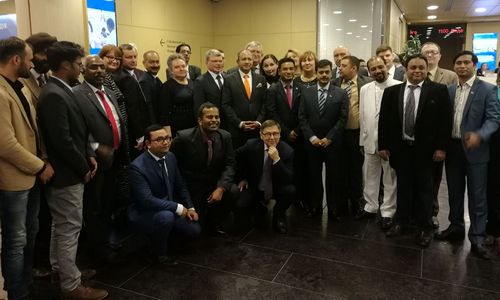On February 26, 2018, an Indian-Russian educational conference was held in Moscow. It was held on the initiative and invitation of the Embassy of India in Russia and personally the Minister of Education at the Indian Embassy in Russia Alok Raj.
Rector of the Dagestan State Medical University Suleiman Mammayev delegated for the conference the deputy head of the international department Sajid Khadzhaliyev, who spoke at the conference with a presentation.
Conference participants: Ambassador Extraordinary and Plenipotentiary of India to Russia Pankaj Saran; representatives of the Ministry of Education of the Russian Federation; Minister of Education of the Embassy of India in Russia Alok Raj; Attaché of the Education Department of the Embassy of India in Russia Suman Krishan Kaul; rector of leading Russian universities, vice-rector for international relations.
The conference was addressed by the Ambassador of the Republic of India to the Russian Federation Pankaj Saran, the Minister of Education at the Indian Embassy in Russia Alok Raj.
"Today, about 10,000 Hindus are studying in Russia," Mr. Pankaj Saran said in his speech. But this is much less than what could be. And much less than studying in Europe and the United States. "
Separately, Mr. Ambassador noted the high interest of Indian citizens in medical education. 90% of all Indian students in Russia study on a biomedical direction. This, of course, speaks of the competitiveness of the national medical school. High quality with relatively low tuition fees make Russia attractive for a large number of Indian students. At the same time, Ambassador Raj Alok, ambassador and minister of education at the embassy, warned representatives of universities against the pursuit of quantity. They stressed that the internal certification of applicants when leaving the country will also become a regular practice.
They also discussed the issues of optimization of the educational process, adaptation of foreign citizens.
The aim of the conference was to find common ways to expand Russian-Indian cooperation through deepening cooperation in the field of education. The conference paid special attention to the issues of Internet internationalization of Russian and Indian universities. Despite the significant percentage of student exchanges between Russia and India, the potential potential remains unrealized. This situation develops for many reasons, the main of which is the lack of information, the lack of English-language Internet portals (foreign target audiences, applicants, students, scientists, teachers, partners can not find the information they are interested in on the university's website).
In DGMU foreign citizens have been studying since 1987. Over the years, the University has trained more than 1,200 specialists for foreign countries (India, Jordan, Syria, Egypt, Morocco, Lebanon, Palestine, Yemen, Peru, Nepal, Cameroon, etc.); of them graduates, citizens of India (from 1999 to 2017) - 640 people.
The university management pays special attention to the work on teaching foreign citizens. In 2016, after the introduction of English-language teaching at the medical faculty (partially 1-3 courses), the growth of Indian students wishing to study in English sharply increased. 2017-2018 academic year at the university are trained 173 foreign citizens from 29 countries. Currently, 60 people from India study.
In recent years, Russian-Indian relations have experienced a period of growth. The number of international projects is increasing, and student academic mobility is developing.
At the event, measures were discussed to further strengthen Indian-Russian relations in education, culture and the prospects for their strengthening.


